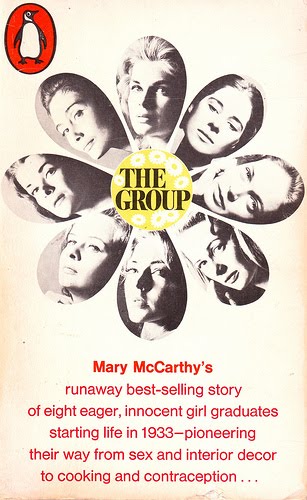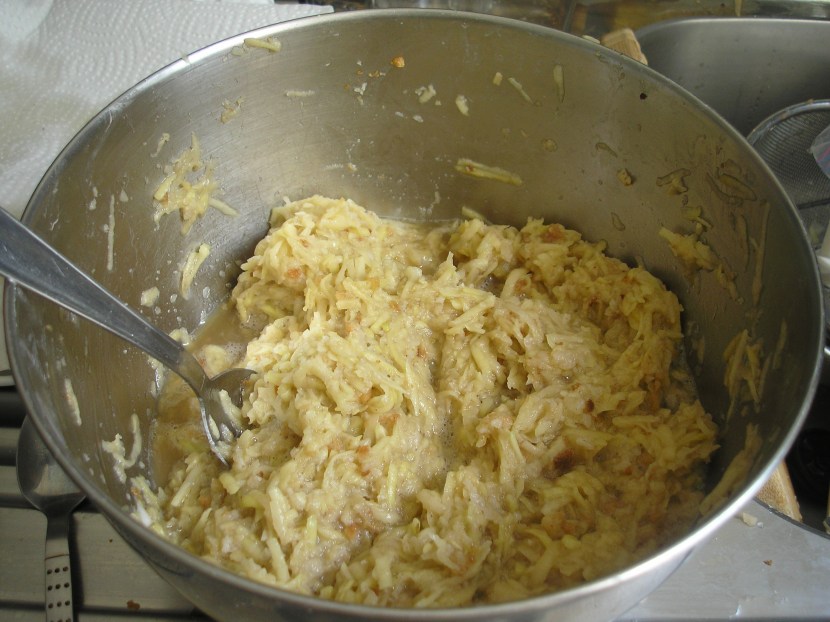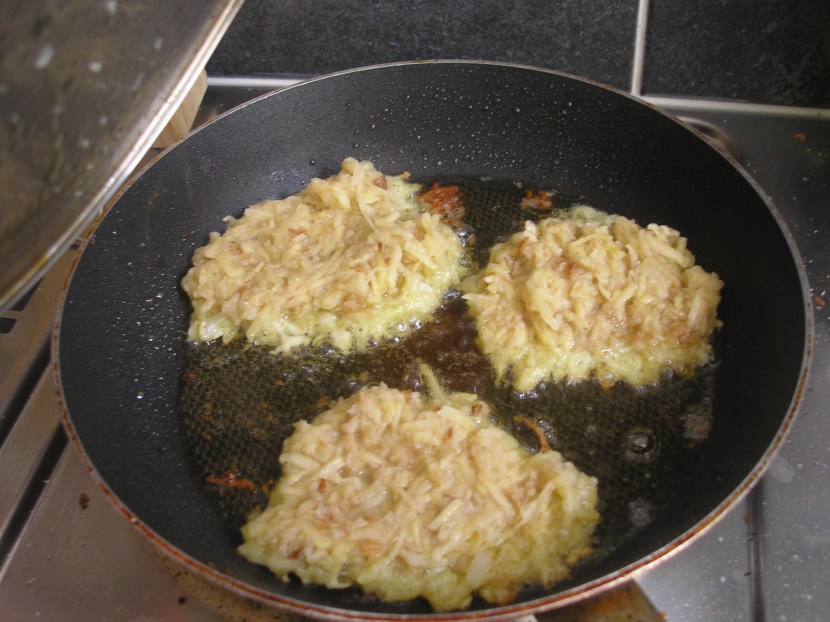Clarence Trolls J-Date: Getting Your Deli Fix in Paris
 B has been working hard on learning Hebrew the past few weeks with the eventual goal of reading the Old Testament. I’ve been working less hard, spending my time buying books that relate to my dissertation and putting them in stacks, working on my origami, and marveling at B’s capacity for filling notebooks with lists of words and conjugations for hours on end. I spent the last few lazy afternoons reading Mary McCarthy’s The Group, which my mother loved when it first came out in the 60s and I’ve been meaning to read for ages. It was pretty great, though it made me thank my lucky stars that I wasn’t born in a different generation. As I have a penchant for loving jerks in literature, my favorite character was Norine Schmittlapp, the nemesis of “the group” and the closest thing to a real radical that McCarthy’s 1930s New York has to offer us. Even so, her portrait is terribly bleak, if surprisingly funny. After her first marriage fails, she marries a wealthy Jewish banker whose family has changed their name from Rosenberg to Rogers, a fact that she shares with “a particular kind of relish” with her aghast acquaintance Priss.
B has been working hard on learning Hebrew the past few weeks with the eventual goal of reading the Old Testament. I’ve been working less hard, spending my time buying books that relate to my dissertation and putting them in stacks, working on my origami, and marveling at B’s capacity for filling notebooks with lists of words and conjugations for hours on end. I spent the last few lazy afternoons reading Mary McCarthy’s The Group, which my mother loved when it first came out in the 60s and I’ve been meaning to read for ages. It was pretty great, though it made me thank my lucky stars that I wasn’t born in a different generation. As I have a penchant for loving jerks in literature, my favorite character was Norine Schmittlapp, the nemesis of “the group” and the closest thing to a real radical that McCarthy’s 1930s New York has to offer us. Even so, her portrait is terribly bleak, if surprisingly funny. After her first marriage fails, she marries a wealthy Jewish banker whose family has changed their name from Rosenberg to Rogers, a fact that she shares with “a particular kind of relish” with her aghast acquaintance Priss.
In fact, Priss’s chance encounter with Norine near the end of the novel was one of the best and sharpest parts of the book. Priss meets Norine in the park, where Norine is pushing her infant son Ichabod (“‘Aren’t you afraid he’ll be called ‘Icky’ in school?’ she asked impulsively. ‘He’ll have to learn to fight his battles early,’ philosophized Norine. ‘Ichabod the Inglorious. That’s what it means in Hebrew. No glory.’”) around naked in his expensive stroller. Norine casually pats her son’s penis, a practice that scandalizes Priss, who is terrified of arousing her own toddler son and would almost rather “he be dirty than have him get an Oedipus complex from her handing him.” Norine insists that Priss come over to her lavishly furnished but disheveled home that nevertheless the site of a well-regarded bohemian salon. There, Norine recounts to Priss her affair with another woman’s husband and is brashly matter-of-fact about her sexual proclivities and experiences. When Priss attempts to describe her (or more accurately, her husband’s) behaviorist theories of child-rearing, Norine condescends the poor woman. “‘You still believe in progress,’ she said kindly. ‘I’d forgotten there were people who did. It’s your substitute for religion. Your tribal totem is the yardstick. But we’ve transcended all that. No first-rate mind can accept the concept of progress any more.’” When Priss accuses Norine of having abandoned her political radicalism, Norine declares that she leaves politics to her husband Freddy:
“Being a Jew and upper crust, he’s profoundly torn between interventionism abroad and laissez faire at home. Freddy isn’t an intellectual. But before we were married, we had an understanding that he should read Kafka and Joyce and Toynbee and the cultural anthropologists. Some of the basic books. So that semantically we can have the same referents.”
According to Norine, Freddy tolerates this curriculum requirement because
“Freddy’s philopregentitive; he’s interested in founding a dynasty. So long as I can breed, I’m a sacred cow to him. Bed’s very important to Freddy; he’s a sensualist, like Solomon. Collects erotica. He worships me because I’m a goy. Besides, like so many rich Jews, he’s a snob. He like to have interesting people in the house, and I can give him that.”
In her own self-diagnosis, Norine’s only real problem is “her brains”:
“[I was] formed as an intellectual…Freddy doesn’t mind that I can think rings around him, he likes it. But I’m conscious of the yawning abyss. And he expects me to be a Hausfrau at the same time. A hostess, he calls it. I’ve got to dress well and set a good table. He think it ought to be easy because we have servants. But I can’t handle servants. It’s a relic, I guess, of my political period. Freddy’s taken to hiring them himself, but I demoralize them, he says, as soon as they start in the house. They take a cue from my cerebralism. They start drinking and padding the bills and forgetting to polish the silver. […] I’ve been trying to turn over a new leaf, now that we have a new house. I start out with a woman who comes to massage me and give me exercises to relax. But before I know it, I’m discussing the Monophysites or the Athanasian Creed or Maimonides. The weirdest types come to work for me; I seem to magnetize them. The butler we have now is an Anthroposophist. Last night he started doing eurhythmics.”
When Priss asks if Norine really regrets the Vassar education the women shared, Norine declares “ ‘Oh completely…I’ve been crippled for life.’”
Of course it’s obvious to both Priss and the reader that Norine’s real problem is not her cerebralism but her narcissism and anti-Semitism, which become apparent when calls her own husband a “Yip” and asks Priss with more than a touch of anxiety if she thinks that “Ichabod looks Jewish.” Norine is the great satirical monster of the text, a totally unsympathetic character that is an ingenious cipher for the other women’s anxieties, be they about housekeeping, sexual prowess, education, or parenting. But in her own right, she is such a riveting mess, with the neck-rings on her blouses and her dirty polar bear skin rug; her theories about underlying lesbian drives, oral gratification and penis-envy that are coupled with her brassy declaration that “Freud is out of date”; and her ad hoc parenting cues taken from anthropological texts about the Pueblo Indians. She wears little Ichabod in proto-Baby Björn to a funeral and declares that it serves the same function as a papoose, allowing her to give Ichabod the experience of death early, rather like the mumps. She serves enormous wedges of chocolate cake to the children for lunch. I rather loved her.
Anyway, I don’t know if it’s my boyfriend’s newest obsession with acquiring Hebrew or reading about old-school New York and the dangerous shiksa Norine for the past few days, but I’ve been longing for some serious kosher deli food. I usually get my fix in Paris with a quick trip to Florence Kahn (24 rue des Ecouffes at the corner of 19 rue des Rosiers, 75004 Paris, Métro St. Paul), a fabulous Jewish traiteur in the Marais with one of the best tile mosaic storefronts you’ll ever see.
Inside, you’ll find an amazing selection of fresh bread and pastries, pickled herring and other smoked fishes, blinis, pickles, goulash, latkes, and pierogis, as well as house-cured and smoked pastrami, corned beef, and tongue. My go-to choice:
The Big Pletzel Sandwich. That’s really what it’s called, meaning ordering it always feels kind of silly: “Je voudrais un Big Pletzel Sandwich, si’l vous plaît.” For about seven euros, you get an enormous fresh bun filled with layers of homemade pastrami, pickles, roasted red peppers, fresh tomatoes, and some kind of unidentified special sauce. You can get it warmed up and take it to go, or you can sit in their lovely outdoor seating and watch the rue de Rosier hoards line up at L’As du Falafel. Florence Kahn is a great alternative to falafel if the lines at L’As are daunting or if you want a real carnivore fix. It’s also a lovely place to buy the fixings for a picnic or an easy dinner, like this one I made earlier this week:
I bought the blinis and the glorious lox at Florence Kahn. I gave the blinis a quick shake in some melted butter in a pan, and added some crème fraîche, capers, and red onion that I had in my fridge. Much fancier and more delicious than it had any right to be, especially given how easy it was to prepare.
The one thing I hesitate to buy and reheat, however, are latkes. Somehow preprepared or frozen ones are never quite right, even if you fry them in oil. Ever since I saw a soggy tray of them at Florence Kahn, I’ve had proper latkes on the brain. Today I pushed up my sleeves and got to work. I’d never made them before, so I got some ideas from Epicurious and the food section of the New York Times online. I settled on this compromise recipe (based on what I had on hand):
9 all-purpose white potatoes, peeled, grated, and drained
½ of a white onion, grated
1 shallot, grated
3 eggs, beaten
¾ cup of baguette breadcrumbs (you’re supposed to use matzo meal, but all the kosher stores are on vacation, just like the rest of Paris in August)
Salt and pepper
Canola oil for frying (I used extra virgin olive oil, because my kitchen is too small for ingredients I rarely use)
Applesauce and sour cream for serving (crème fraîche if you’re on this side of the pond)
After peeling and grating for what seems like forever, incorporate your potatoes, onion, shallot, and eggs together. Then, add breadcrumbs (or matzo meal) gradually to soak up the excess liquid. Salt and pepper to taste.
Heat up about two tablespoons of oil in a deep frying skillet. When crackly, add a heaping tablespoon of the batter to the oil, patting it down with the back of your spoon to form a thick pancake. Fry each side 2-3 minutes or until golden brown and lacy at the edges. I was able to fit three latkes in each batch, and each batch took approximately one Róisín Murphy jam to cook. I incurred only two minor splatter burns in the whole process (the cost of doing business if you ask me). I may or may not have been pretending to be Polly, the most sympathetic member of The Group, who cooked grandiose meals every night for her publisher lover (scandalous!) on her tiny hotplate.
Drain on papertowels.
Keep the earlier batches warm, either in a low oven (aren’t you a fancypants!) or in a covered pan.
Serve with sour cream and applesauce, preferably to a bewildered student of Hebrew, who will likely seem very impressed at your labor-intensive weekday lunch.










Got my mouth watering on this one!
I haven’t read The Group since it came out, but I remember the woman being bullied into breastfeeding even though she didn’t want to do it. Must re-read. It’s probably a more important book than it appeared to be at the time.
And talk about narcissists! Mary McCarthy was amazing that way!
Can I borrow The Group? It sounds amazing!
The Group is yours, dear Londoner! I’ll give it to you when you visit next week! Whee!
For a tad less labor, you could also follow your (and my) fantasy friend’s recipe:
http://video.nytimes.com/video/2005/12/22/dining/1194817120837/potato-nik.html
Bittman’s, How to Cook Everything, also includes beet an zucchini versions.